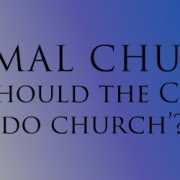One Woman’s Story
A couple of weeks ago in our Men’s Bible Study Calvary Chapel Santa Cruz we looked at the subject of repentance. For many guys, a surprising aspect of that study was the fact that repentance is not only for the time one initially responds to Christ. Repentance is for Christians as well as non-Christians.
Our study that night began with a story of one woman’s repentance. Here is how her story began:
“After 23 years of being active in church life, I was burned out. I was tired of trying to live the Christian life, and in my heart I knew I was only giving lip service to the Lordship of Christ. My heart had become cold and calloused. I sought escape through sleep (having been addicted to over-the-counter sleeping pills for years), hobbies, novels, television—anything to fill the void and to avoid facing the barrenness of my life.”
This woman suffered from what many church goers suffer from … she had no idea what it meant to have an authentic relationship with Jesus Christ. She didn’t know what it really meant to follow Him.
She was active in church life. She was active in the mechanics of the church, the activities of the church. (But the church is first and foremost supposed to be a fellowship of believers, not an organization; the church exists for God and for each other, and as witnesses of Christ to the world around us. The church doesn’t exist for the purpose of maintaining its existence.)
She was tired of trying to live the Christian life. Somewhere along the line it became her burden to live a certain way. She was trying to do what many people end up doing … she focused on rules she should obey, spiritual practices she should engage in, the group she should be a part of. All of it was the thinking that if I perform … if I obey … I’m accepted. The gospel is the opposite: the gospel says to the true believer that because you’ve identified with Jesus Christ and are in Him, you are fully accepted, therefore you obey. Jesus Himself actually comes to live within the true believer, by the Holy Spirit, to give us what we need to live this life. It’s Christ in us, the hope of glory.
She knew in her heart that she was only giving lip service to the Lordship of Christ. Outwardly, she was acting like other people thought she should act like, at least in public. But in her heart she was a mess, and she knew it. Jesus was not her Master, her Lord, in the day-to-day, moment-by-moment things of her life. She was a hypocrite, because her heart and real, inner life were the opposite of her public, external life. In her real life, she was addicted to drugs, and addicted to mind-numbing activities all designed to keep her from facing the truth about herself. She was miserable and depressed. She started blaming her husband, living in a dream world in which she imagined living life without him. She began to think about divorce…
Happily, this woman’s story ended well, and is ending well. She became so desperate that she cried out to God, for Him to do a work in her life. She admitted to God her sins borne of pride, took responsibility for her own attitudes and actions, and quit blaming her husband. She turned from her destructive, mind-numbing behaviors. She allowed the Lord to revive her heart, which He did.
Prior to her repentance and personal awakening, this woman put the proverbial cart before the horse. She put the doings of the Christian life before the identity of the Christian life. Many do the same thing today. Like this woman, many of us need to learn the difference between religion and relationship; between duty and devotion; between law and love. Jesus calls us into relationship first. The responsibilities He gives us and commands He lays upon us flow from that relationship.
The Great Commission
The church is commissioned to evangelize the world and make disciples of Jesus. The Lord Jesus has called us to follow him (discipleship), and then help others to do the same.
This entire process is unique, according to the tradition of the Jewish people. In their culture, students chose their rabbis (teachers), not the other way around. A student would observe a rabbi, learn about his teaching and influence, and then say to him, “I want to study with you.” If a rabbi was noteworthy, he would have many such requests. But Rabbi Jesus calls us to follow Him, to be His students. The message in this is clear: calling is on Jesus’ terms. No one can have a relationship with Jesus unless He calls them into it. It’s a privilege by invitation only, and only from Jesus Himself. Thankfully, we’ll see that He does call anyone who desires to follow Him, to follow Him.
“If anyone desires to come after Me, let him deny himself, and take up his cross, and follow Me.” (Matthew 16:24)
This is an inestimable honor. Imagine a human king or president inviting us to spend just a single day with him. We’d have quite a story to tell, memories to share. It would be an unforgettable experience. Yet our Lord Jesus … who is the King of kings … calls us to follow Him, to spend each and every day with Him. There are conditions, of course. We’ve got to say no to the self life. He must have full access to us—to our hearts, our wills, and our decisions. He is Lord, and totally expects us to treat Him as such.
The Basis of Our Identity
In most cultures in the world, their family is the basis of their identity. The family name, the family reputation, the members of the family, what your father does, what he is within the community … these all reflect on the individual. An individual is the product of his/her family.
Not so in relationship to Jesus. He demands allegiance beyond our human families. In fact, if we can’t put Him first within the context of our human family, we’ll have to leave our family to follow Him.
We are human beings, not human do-ings. Our lives are hidden with Christ in God. The only real and true thing about us is what God says. For the true believer, what God says has to do with who we are in Christ.
Freedom from the Confusion of Religion
We desperately need to be freed from the errors and confusion of religion. The truth is that it’s all about Jesus, the God-man, our Savior, the Messiah, our Lord and God. If it’s about Him, it won’t be about religion (in the negative sense of the word).
When Peter said to Jesus “You are the Christ, the Son of the living God,” he was saying to Him “You are the Messiah, the One whom all the Law and the Prophets said would come. You are the Son of the living God, the Lord of glory, equal to the Father, very God of very God, the eternal Word who became flesh and dwelt among us.”
The One who commands the winds and the sea, who raises the dead and gives life to whom He wills, who heals every kind of disease, who taught with the authority of God Himself (“I say unto you!”), who forgives sins (because He is the One we have sinned against), who was crucified on a Roman cross, and who raised Himself from the dead three days later, is the same One who has invited us into His life to follow Him. Because of who He is, He is supremely worthy of being followed.
“If anyone desires to come after Me, let him deny himself, and take up his cross, and follow Me.” (Matthew 16:24)
We Follow Not Knowing Everything About Where We’re Going
We start out on this journey with Jesus not really knowing where it’s all going to lead us.
When I was called to follow Jesus, I was in the process of completing my college degree so I could go into coaching and teaching. I soon realized that was not what the Lord wanted. So then I floundered around a bit … headed over to the city of Orange, CA to apply for a position with the fire or police department. That wasn’t it, either. Not what Jesus wanted. Then one day I took the steering wheel at 10:00 and 2:00 o’clock, and asked the Lord to direct my steering, so He would show me where He wanted me to go.
I was like a child; I had no idea what it would be like, and the things that would actually happen. I was like a young man sitting with his fiancée in the pastor’s office, doing premarital counseling. Almost every young couple I’ve ever met with was pretty sure they understood what marriage is all about. But marriage is a journey.
So is this Christian life, following Jesus. It’s a journey for every true follower. For the pretender, or for the one who wants to do Christianity in moderation, it’s boring or wearisome.
Following Jesus, we only need to stay close to Him and we’ll find out what who we are, and what He wants. I don’t need to know everything about the way, only that He is the Way.
Imagine Paul: he was told how many things he would suffer, and that he would bear Christ’s name before the Jews, Gentiles, and even kings. But he probably didn’t know that after some early “success,” he’d be spending 8-10 years of his early walk with Christ in his hometown of Tarsus.
Phillip most likely didn’t know that after serving the Grecian widows in the Jerusalem church, he’d end up leading many Samaritans to the Lord. And then when the Lord told him to leave Samaria and go south to the desert, he didn’t know the reason. Then after finding the Ethiopian eunuch and leading him to Christ, he had no idea how he ended up at Azotus. All he did know was that he should continue on following Jesus.
No one who follows Jesus sticks with his/her own plans. That’s the essence of following Him. It’s not about trusting our own hearts or leaning on our own understanding, but it is about trusting Jesus Christ and asking Him to lead and guide us in every part of life … in our relationships, in our work, in our service, in everything.
Many have become convinced that the Christian life is about doing Christian things.
- The Christian life is about feeding the poor.
- The Christian life is having and maintaining a devotional life.
- The Christian life is being missional.
But all of these approaches are putting the proverbial cart before the horse.
 When we do that, we get stuck like the woman in the beginning of this blog. The so-called Christian life bears no actual resemblance to the real thing. That “life” is boring, binding, and blinding.
When we do that, we get stuck like the woman in the beginning of this blog. The so-called Christian life bears no actual resemblance to the real thing. That “life” is boring, binding, and blinding.
The actual life we have in Jesus is exciting, freeing, and eye-opening.
It’s sad that so many today are being called only to “accept Jesus.” In reality, that’s only the beginning. The real thing begins when we follow Him.









